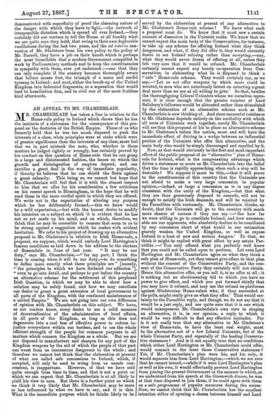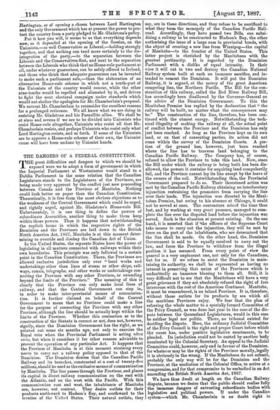AN APPEAL TO MR. CHAMBERLAIN.
MR. CHAMBERLAIN has taken a line in relation to the Home-rule policy in Ireland which shows that he has the instincts of a statesman for the consequence of this pro- posal on the destinies of the British Empire. Those of us who formerly held that he was too much disposed to push the interests of a ()lass, when principles were at stake which were of greater significance than the interests of any class, must feel that we in part mistook the man, who, whether in those matters he judged rightly or wrongly, has certainly proved by his conduct on this question of Home-rale that he can grasp in a large and disinterested fashion, the issues on which the growth and disintegration of empires depend, and can sacrifice a great deal in the way of immediate popularity, if thereby he believes that he can shield the State against a great calamity. This being so, we cannot but hope that Mr. Chamberlain will feel that it is with the utmost respect to him that we offer for his consideration a few criticisms on his recent speech in Birmingham, in the hope that he will read them in the same cordial spirit in which they are offered. We write not in the expectation of altering any purpose which he has deliberately formed,—this we know would be a wild expectation,—but with the honest desire to modify his intention on a subject on which it is evident that he has not as yet made up his mind, and on which, therefore, we think that he may be accessible to reasons that seem to us to be strong against a suggestion which he makes with evident hesitation. We refer to his project of drawing np an alternative proposal to Mr. Gladstone's in relation to Irish Horne-rule, a proposal, we suppose, which would embody Lord Hartington's famous conditions as laid down in his address to the electors
of Rossendale in June of last year. " It may be our duty," says Mr. Chamberlain,—" for my part, I think the time is coming when it will be our duty,—to do something to define more exactly what these principles are " [namely, " the principles to which we have declared our adhesion "], "even to go into detail, and perhaps to put before the country an alternative scheme for the settlement of this perplexed Irish Question, in which we may be able to show how a solution may be safely found, and how we may conciliate our desire to grant a great extension of local government to all parts of the Kingdom, with the continued maintenance of a united Empire." We are not going into our own difference of opinion with Mr. Chamberlain on this subject. We have, as our readers know, every desire to see a solid measure of decentralisation of the administration of local affairs, in all parts of the Kingdom, so long as this does not degenerate into a real loss of effective power to redress in- justice everywhere within our borders, and to use the whole efficient strength of the people for common purposes in all matters which concern the Kingdom as a whole. But we are not disposed to manufacture and sharpen for any part of the Kingdom weapons by the aid of which the people of that part can wrest from us concessions dangerous to the whole ; and therefore we cannot but think that the elaboration at present of what are called safe concessions to Ireland, which, if accepted, will only be used to wring from us unsafe con- cessions, is inopportune. However, of that we have said quite enough from time to time, and that is not a point on which we can expect that Mr. Chamberlain is at all likely to yield his view to ours. But there is a further point on which we think it very likely that Mr. Chamberlain may be more or less influenced by what we have to say, and it is this. What is the immediate purpose which he thinks likely to be served by the elaboration at present of any alternative to Mr. Gladstone's Home-rule scheme ? We know what such a proposal must do. We know that it must sow a certain amount of dissension in the Unionist ranks. We know that we cannot expect the main body of the Conservatives, for instance, to take up any scheme for offering Ireland what they think dangerous, and what, if they did offer it, they would earnestly desire to see Ireland refusing rather than accepting,—nay, what they would never dream of offering at all, unless they felt very sure that it would be refused. Mr. Chamberlain certainly cannot expect any hearty co-operation from Con- servatives, in elaborating what he is disposed to think a " safe " Home-rule scheme. They would certainly say, as we say,—' Let us not offer weapons by which more could be wrested, to men who are notoriously intent on extorting a great deal more than we are at all willing to give.' So that, besides the thoroughgoing Liberal Unionists whom we ourselves repre- sent, it is clear enough that the greater number of Lord Salisbury's followers would be alienated rather than stimulated by the elaboration of an alternative scheme such as Mr. Chamberlain is now thinking of. And since successful resistance to Mr. Gladstone depends entirely on the cordiality with which all sorts of Unionists work together, surely Mr. Chamberlain will see that this proposal of his to place an alternative scheme to Mr. Gladstone's before the nation, must and will have the immediate effect of driving in a wedge between an influential portion of the Unionists who offer this alternative, and the main body who would be simply discouraged and repelled by it.
Now, as that would obviously be the first and most important effect of the public proposal of an "alternative " plan of Home- rule for Ireland, what is the compensating advantage which drives a statesman so acute as Mr. Chamberlain into the belief that the time is rapidly approaching when such a step will be desirable ? We suppose it must be this,—that it will prove to the constituencies of this country that the Unionists are not afraid to make a very large concession to popular opinion,—indeed, as large a concession as is in any degree consistent with the unity of the Kingdom,—but that what they are thus generously disposed to concede, will not be enough to satisfy the Irish demands, and will be rejected by the Parnellites with contumely. Mr. Chamberlain thinks, no doubt, that the Unionists will go to the country with much more chance of success if they can say See how far we were willing to go to conciliate Ireland, and how unreason- able are our opponents, who absolutely decline to be conciliated by any concession short of what would in our estimation gravely weaken the United Kingdom, as well as expose Ireland to a host of new and serious dangers.' To that, we think it might be replied with great effect by any astute Par-
nellite You only offered what you perfectly well knew, that you could not be called upon to perform. Let even Lord Harlington and Mr. Chamberlain agree on what they think a safe plan of Home-rule, yet they cannot give effect to that plan. without the consent of the Conservative Party, and the con- sent of the Conservative Party they certainly will not obtain. Hence this alternative offer, as you call it, is no offer at all ; it is nothing but an electioneering bid to which you have no power to give effect, and which you put forward chiefly that you may have it refused, and may use the refusal on platforms against Gladstonian Home-rulers who, if they succeeded at the polls, might really give us what they offer.' That would cer- tainly be the Parnellite reply, and though we do not say that it would be a just reply, and are quite sure that it is one which would misrepresent Mr. Chamberlain's own view in shaping an alternative, it is, in our opinion, a reply to whioh it would be very difficult to find any effective rejoinder. For is it not really true that any alternative to Mr. Gladstone's view of Home-rule, to have the least real weight, must be the alternative not of a few Liberal Unionists, but of the whole Unionist Party, and especially of the leading Conserva- tive statesmen? And is it not equally true that no conditions which either Lord Hartington or Mr. Chamberlain could offer, would commit in the least those Conservative statesmen Yet, if Mr. Chamberlain's plan were his, and his only, it would separate him from Lord Hartington,—which we are sure that he cannot intend,—while if it were Lord Hartington's plan as well as his own, it would effectually prevent Lord Hartington from joining the present Government in the manner in which, as we understood from his speech at the Greenwich dinner, he was at that time disposed to join them, if he could agree with them on a safe programme of popular measures during the recess. Now, we cannot think that Mr. Chamberlain has the smallest intention either of opening a chasm between himself and Lord
Harlington, or of opening a chasm between Lord Harlington and the only Government which has at present the power to pro- tect the country from a party pledged to Mr. Gladstone's policy.
Put it how you will, it seems to us that everything depends now, as it depended at the opening of the Session, on the Unionists,—as well Conservative as Liberal,—holding strongly together, and that nothing can tend more certainly to the dis- integration of the party,—to the separation between the Liberals and the Conservatives first, and next to the separation between the Liberals who think that no Home-rule parliament at all, under whatever guarantees, can be safely offered to Ireland, and those who think that adequate guarantees can be invented to make such a parliament safe,—than the elaboration of an alternative Home-rule scheme in which not a tenth-part of the Unionists of the country would concur, while the other nine-tenths would be repelled and alienated by it, and driven to fight the next electoral campaign under standards which would not shelter the apologists for Mr. Chamberlain's proposal. We entreat Mr. Chamberlain to reconsider the excellent reasons for a prolonged reticence. We all know what we are doing in resisting Mr. Gladstone and his Parnellite allies. We shall be at sixes and sevens if we are to be divided into Unionists who resist Home-rule altogether, Unionists who resist all that Mr. Chamberlain resists, and perhaps Unionists who resist only what Lord Harlington resists, and so forth. If some of the Unionists are to approve a Home-rule scheme of their own, the Unionist cause will have been undone by Unionist hands.



































 Previous page
Previous page